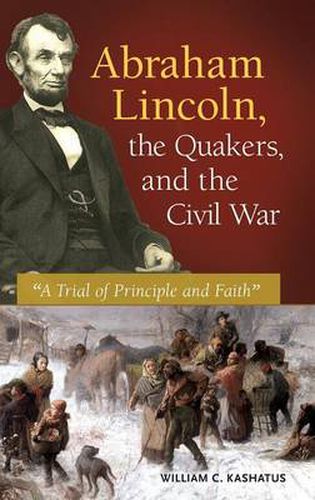Readings Newsletter
Become a Readings Member to make your shopping experience even easier.
Sign in or sign up for free!
You’re not far away from qualifying for FREE standard shipping within Australia
You’ve qualified for FREE standard shipping within Australia
The cart is loading…






This unique addition to Civil War literature examines the extensive influence Quaker belief and practice had on Lincoln’s decisions relative to slavery, including his choice to emancipate the slaves.
An important contribution to Lincoln scholarship, this thought-provoking work argues that Abraham Lincoln and the Religious Society of Friends faced a similar dilemma: how to achieve emancipation without extending the bloodshed and hardship of war. Organized chronologically so readers can see changes in Lincoln’s thinking over time, the book explores the congruence of the 16th president’s relationship with Quaker belief and his political and religious thought on three specific issues: emancipation, conscientious objection, and the relief and education of freedmen.
Distinguishing between the reality of Lincoln’s relationship with the Quakers and the mythology that has emerged over time, the book differs significantly from previous works in at least two ways. It shows how Lincoln skillfully navigated a relationship with one of the most vocal and politically active religious groups of the 19th century, and it documents the practical ways in which a shared belief in the Doctrine of Necessity affected the president’s decisions. In addition to gaining new insights about Lincoln, readers will also come away from this book with a better understanding of Quaker positions on abolition and pacifism and a new appreciation for the Quaker contributions to the Union cause.
Explains the critical role Quakers exercised in Lincoln’s prosecution of the Civil War
Reveals how Quakers employed their historic commitments to abolitionism and pacifism to convince Lincoln of the necessity of emancipation, freedmen’s relief and education, and conscientious objection
Highlights Lincoln’s interactions and correspondence with individual British and American Quakers and Quaker groups
Provides readers with important context necessary to understand one of the nation’s most respected humanitarian groups
Includes nearly two dozen period photographs that provide a fascinating glimpse into long-ago history
Examines the Quakers’ 150-year crusade against slavery, their efforts to improve the conditions of free blacks, and the religious beliefs that informed those activities
$9.00 standard shipping within Australia
FREE standard shipping within Australia for orders over $100.00
Express & International shipping calculated at checkout
This unique addition to Civil War literature examines the extensive influence Quaker belief and practice had on Lincoln’s decisions relative to slavery, including his choice to emancipate the slaves.
An important contribution to Lincoln scholarship, this thought-provoking work argues that Abraham Lincoln and the Religious Society of Friends faced a similar dilemma: how to achieve emancipation without extending the bloodshed and hardship of war. Organized chronologically so readers can see changes in Lincoln’s thinking over time, the book explores the congruence of the 16th president’s relationship with Quaker belief and his political and religious thought on three specific issues: emancipation, conscientious objection, and the relief and education of freedmen.
Distinguishing between the reality of Lincoln’s relationship with the Quakers and the mythology that has emerged over time, the book differs significantly from previous works in at least two ways. It shows how Lincoln skillfully navigated a relationship with one of the most vocal and politically active religious groups of the 19th century, and it documents the practical ways in which a shared belief in the Doctrine of Necessity affected the president’s decisions. In addition to gaining new insights about Lincoln, readers will also come away from this book with a better understanding of Quaker positions on abolition and pacifism and a new appreciation for the Quaker contributions to the Union cause.
Explains the critical role Quakers exercised in Lincoln’s prosecution of the Civil War
Reveals how Quakers employed their historic commitments to abolitionism and pacifism to convince Lincoln of the necessity of emancipation, freedmen’s relief and education, and conscientious objection
Highlights Lincoln’s interactions and correspondence with individual British and American Quakers and Quaker groups
Provides readers with important context necessary to understand one of the nation’s most respected humanitarian groups
Includes nearly two dozen period photographs that provide a fascinating glimpse into long-ago history
Examines the Quakers’ 150-year crusade against slavery, their efforts to improve the conditions of free blacks, and the religious beliefs that informed those activities